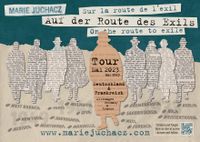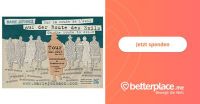Project information, biography and donations
The project: “Marie Juchacz – On the route to exile“...
...is a research project on the exile route Marie Juchacz took from 1933. A research tout took place in May and June 2023 during which the exile route of Marie Juchacz (1879-1956), SPD (Social Democrat) member of the Reichstag (until 1933), feminist, social reformer and founder of the German Workers‘ Welfare Association (Arbeiterwohlfahrt, AWO), was retraced and examined more closely.
Lydia Struck, cultural anthropologist and great-grandniece of Marie Juchacz is leading this project as a private initiative.
Donations towards the costs of this research project, irrespective of the amount, will be greatly appreciated.
Lectures can be booked by arrangement in advance.
What issues are to be examined during the project:
The few personal letters written by Marie Juchacz to friends that had been retained provide information on the places where Marie Juchacz found refuge as from the end of April 1933 when National Socialists in Germany presented a threat to her life. The letters also give examples of how the resistance work of the group she was with defined her everyday life. Also that help was provided by people in France. A lot of information to follow up is also provided in the biography of the Reichstag member Emil Kirschmann published by Axel Redmer (1987). Entitled: “Wer draußen steht, sieht manches besser” (Those that stand on the outside, get a better view of some things”. These sources, both letters and publications, complement each other and act as indications in the search for further traces.
The Questions were: Are there perhaps more sources in local archives? Can anyone (in the second generation) provide information on the “Kirschmann Group“ that could lead to new discoveries? Despite their meticulous obliteration of “incriminating evidence” before moving on, it was hoped that certain objects or documents can be retrieved as a result of which some relevant information about the corresponding period of exile could be gained.
New facts and questions were published regularly on a Project Travel-Blog .
The story
By 1933 Marie Juchacz’s life was in danger in Germany. Friends had advised her to leave Germany as quickly as possible. She followed this advice and, until her final exile in the USA (1941-1948), first stayed in the Saarland, which at that time was still under the administration of the League of Nations.
BIOGRAPHY - WHO WAS MARIE JUCHACZ?
Marie Juchacz (1879 - 1956)
SPD (Social Democrat) Member of the Reichstag (until 1933), feminist, social reformer and founder of the German Workers Welfare Association (Arbeiterwohlfahrt, AWO).
Childhood
She first worked as a domestic servant, then in a net factory, later as an orderly, following which she learned the trade of seamstress. Her family encouraged her political education. She developed a strong interest in women’s politics at an early age. In 1903 she married the tailor Bernhard Juchacz, with whom she set up a mutual workshop and started a family. Their two children, Charlotte and Paul were born in 1903 and 1905. Shortly after the birth of her second child, Marie Juchacz separated from her husband and moved to Berlin in 1906.
Berlin and politics
Her younger sister Elisabeth Kirschmann-Röhl followed her. In 1907 the two women joined the SPD party and became popular speakers. In Berlin they first lived at her brother Otto Gohlke’s and, after the wedding of Elisabeth and Gustav Röhl they moved into a communal apartment in Berlin-Schöneberg and later in Rixdorf near Berlin), today’s Berlin-Neukölln where Marie’s children Charlotte and Paul grew up together with Fritz, the son of Elisabeth and Gustav Röhl. The two sisters gradually took up political work. In 1913 Marie Juchacz was appointed as Secretary for Women’s Issues by the leaders of the SPD in the district known at that time as the ”Obere Rheinprovinz" and moved to Cologne. She gave speeches throughout the district and tried to find out from the women attending what their lives were about, what they lacked and what they expected from the SPD. Elisabeth also separated from her husband and followed Marie Juchacz with the three children to Cologne. They were soon joined by Emil Kirschmann whom Elisabeth later married.
At the beginning of the First World War, Marie Juchacz and Elisabeth Kirschmann-Röhl, together with some of their female friends, including Else Meerfeld, joined in the activities and help projects run by the National Women’s Community in Cologne. The home workers‘ centre (Heimarbeitszentrale) in which women (in particular) sewed clothing for soldiers from second-hand garments.
On 13th December 1919 Marie Juchacz founded the Workers‘ Welfare Association together with other social democrats, with its head office in Berlin. The AWO was an organisation that was to offer help for self-help and was not intended as an organisation simply for handing out alms. Numerous facilities of various kinds were set up.
Resistance to National Socialism
In 1930, in the middle of their election campaign, Elisabeth Kirschmann-Röhl died unexpectedly and left a large gap in the life of Marie Juchacz. However, Marie Juchacz continued her fight against the political currents of National Socialism. She tried to relieve poverty and to offer young people an alternative to the undertow of the National Socialist movement. Even in her speeches, she warned about the consequences that the crumbling of the carefully built up social state could have. The Weimar Republic was dissolved upon the seizing of power by the NSDAP and people who, like Marie Juchacz, had opposed their politics, were now in danger of their lives.
In American Exile
After the three had first been accommodated by Emil‘s brother in Meriden, Marie began to look for help. The meanwhile 63-year-old was able to learn English in a Quaker home in West Branch, Iowa and a few months later moved with Emil Kirschmann and Käthe Fey to New York to the Bronx district in a three-room flat. After the end of the Second World War, they succeeded in supporting the reconstruction of the Workers’ Welfare Association (AWO) in Germany from New York by sending emergency consignments (CARE packets), and upon the founding of the Arbeiter-Wohlfahrt New York, they despatched parcels to Germany to the “Victims of National Socialism”. They also kept in close communication by letter with Lotte Lemke in Hanover (Germany), who took on the General Management of the new Workers’ Welfare Association AWO in Germany.
DONATE AND SUPPORT
No matter if the donation is small or large - any support is welcome and goes straight into making this research tour possible.
„Marie Juchacz – On the route to exile“ will be talking place in May 2023. You are supporting scientific research and the memory of Marie Juchacz, of her struggle during her escape and her continuous fight against National Socialism.
HELP - DONATE
Please send your donation to:
post@mariejuchacz.com
or to the account:
Bank: Deutsche Bank

.png/picture-200?_=186d7f05fa0)
